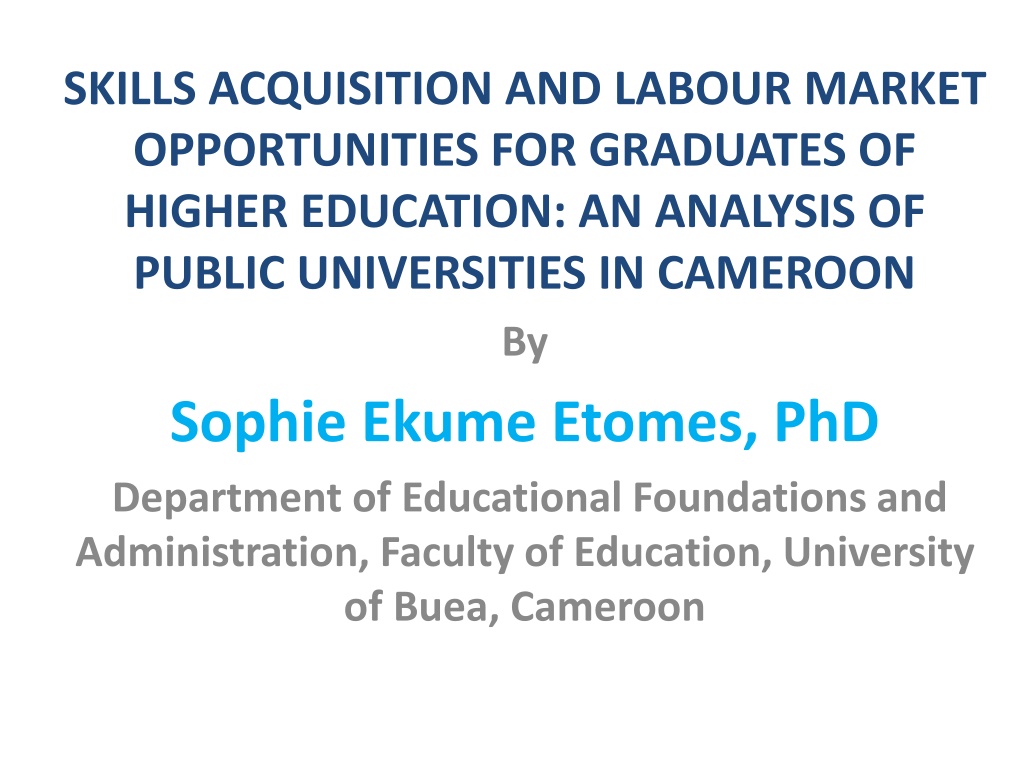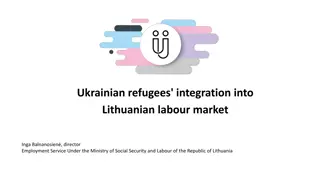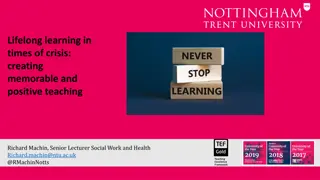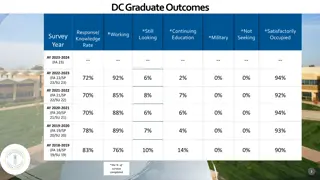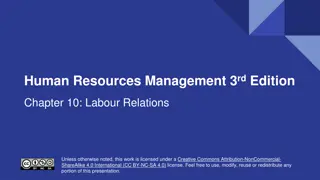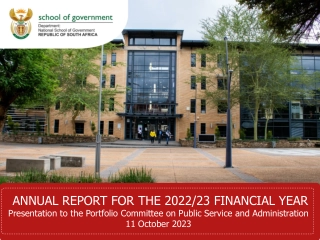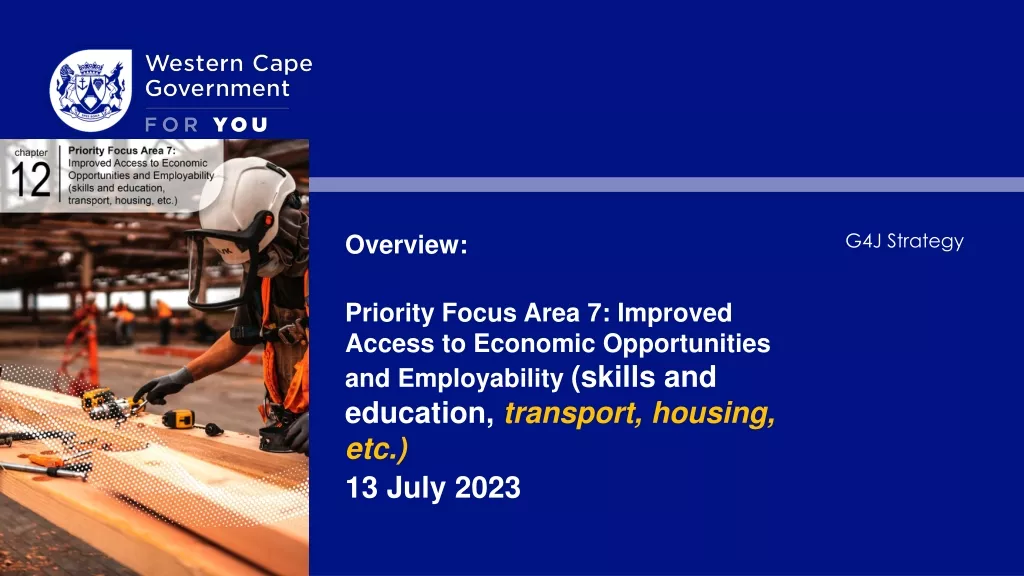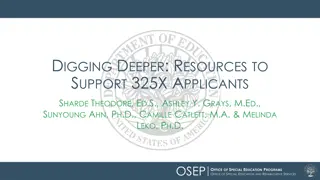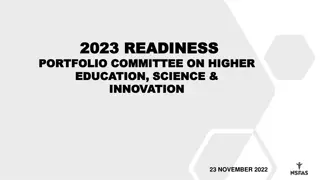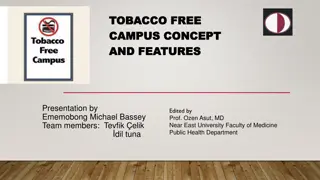Skills Acquisition and Labour Market Opportunities for Graduates in Cameroon's Public Universities
Analysis of the skills acquired by graduates from public universities in Cameroon and their alignment with the demands of the labor market. The study explores the challenges graduates face in transitioning to employment, the competencies needed by the job market, and the role of higher education in shaping students for successful careers. Research objectives focus on social, technical, conceptual, and entrepreneurial skills, with a methodology involving a questionnaire survey of graduates and employers.
Download Presentation
Please find below an Image/Link to download the presentation.
The content on the website is provided AS IS for your information and personal use only. It may not be sold, licensed, or shared on other websites without obtaining consent from the author. Download presentation by click this link. If you encounter any issues during the download, it is possible that the publisher has removed the file from their server.
Presentation Transcript
SKILLS ACQUISITION AND LABOUR MARKET OPPORTUNITIES FOR GRADUATES OF HIGHER EDUCATION: AN ANALYSIS OF PUBLIC UNIVERSITIES IN CAMEROON By Sophie Ekume Etomes, PhD Department of Educational Foundations and Administration, Faculty of Education, University of Buea, Cameroon
INTRODUCTION Graduates of higher education are the major inputs into the labour market and instruments of major changes in the society. This is only possible if the skills acquired are relevant to the society as a whole. Skills acquisition and labour market opportunity. Education as an investment and as a consumption good
CONTINUE. Objectives of higher education in Cameroon; its evolution Graduates of higher education in Cameroon face increasing challenges in the transition to employment Most of the graduates aspire to work with the government and it is obvious that the government cannot employ all graduates.
RESEARCH GOAL The goal of this study is to determine the link between the curriculum of public universities in Cameroon and the needs of the labour market, with focus on skills acquired and graduates employment and to identify the competencies required of university graduates by the labour market.
RESEARCH OBJECTIVES To find out whether Social skills acquired enhance the employment of graduates with Bachelors degree from public universities in Cameroon. To examine the extent to which technical skills acquired enhance the employment of graduates with Bachelors degree from public universities in Cameroon. To investigate the conceptual skills acquired by graduates and the employment of graduates with Bachelors degree from public universities in Cameroon. To examine the extent to which entrepreneurial skills enhances the employment of graduates with Bachelors degree from public universities in Cameroon.
MATERIALS AND METHODS Research design Population 79 graduates and 29 Employers Instrument Questionnaire (closed and open ended Data analysis for quantitative data and thematic approach was used for qualitative data with key concepts/themes, grounding and sample quotation. Survey SPSS (2.0), frequency counts and percentages
FINDINGS AND DISCUSSION SOCIAL SKILLS AND EMPLOYMENT OF GRADUATES INDICATORS Graduates opinion 84.5% agreed that social skills were not developed in their programme of study. - Effective communication in English and French; written communication; Interpersonal skills Work in an interdisciplinary team Multiculturalism, etc - - - - Employers opinion 74.9% indicated that social skill were not developed in graduates degree programme - Effective communication in English and French; written communication; Interpersonal skills Work in an interdisciplinary team Multiculturalism, etc - - - - Discussion: Today s job market favours those who have relevant social skills such as team player, language skills (written and oral) and the ability to find access to new information. the new analysis of Harvard Education Economist, workers who combine social and technical skills are the best in modern economy as measured by a 7.2% point increase in available jobs and 26% wage increase between 1980 and 2012 .
CONTINUE.. TECHNICAL SKILLS AND EMPLOYMENT OF GRADUATES INDICATORS Graduates opinion - 94.9% of the graduates did practical training in the course of their programme - 92.4% carried out independent research projects - 53.2% worked with teachers outside the course requirement - internship, practicum, field experience and worked with other students on projects - Projects, long essay, etc - Projects Employers opinion 87.6% indicated that graduates lack relevant technical skills - Lack the ability to adapt to new changes - Limited leadership skills - Interpretation of given task Discussion: Results revealed that most of the graduates have undergone work-based learning (internship/practicum) but the period of practical training is not enough for effective acquisition of practical knowledge. The duration of practical training as opined by many of the graduates 34(45.9%) was 3months, followed by one month and two months. Only a very few of the graduates stated that their duration of practical training lasted for four months, six months and less than a month. In addition, students did not go for work placement which is very relevant for technical skills acquisition. As such, most of the employers provide in-service training for graduates to gain work experience.
CONTINUE.. CONCEPTUAL SKILLS AND EMPLOYMENT OF GRADUATES INDICATORS Graduates opinion 83.9% indicated that conceptual skills is not well developed - Analytical skills - Communication skills - Creative and self-confidence - Planning and organizing Employers opinion 70.1% indicated that conceptual skills are not well developed in graduates - Planning and organizing - Analytical skills - Problem solving - Communication skills - Creative and self-confidence Discussion: Conceptual skills such as creativity, innovation and problem solving are productive skills that increase the output of any business or organization. Graduates may possess knowledge in their specific area of specialty but to effectively use these skills in the labour market is a problem which is partly caused by lack of work placement and inadequate time for internship. Raykov (2014) explained that, innovative work and creativity are often considered as preconditions for organizational viability in today s highly competitive global economy, they are crucial for the modern economy, employee productivity and participation in organizational change and innovative workplace practices.
CONTINUE.. ENTREPRENEURIAL SKILLS AND EMPLOYMENT OF GRADUATES INDICATORS Graduates opinion - 77.0% indicated that graduates lack entrepreneurial skills. 69.6% employed, 30.4% unemployed & 3 self-emp. - How to start a business - Creativity and innovativeness - How to raise capital - Commercial and legal aspects in a business, etc - Employers opinion 71.9% indicated that graduates lack entrepreneurial skills - How to start a business - Creativity and innovativeness - How to raise capital - Commercial and legal aspects in Discussion: Entrepreneurial education provides relevant skills in graduate such as financial literacy, money management, critical thinking and problem solving abilities which can enable self-employment and gainful employment. Building an entrepreneurial mindset will help to solve major problems in the society given that there is a direct relationship between entrepreneurial activities and economic development. Entrepreneurial education will also enable the applicability of knowledge acquired in practical situations which provides a wider opportunity for graduates in the labour market.
CONCLUSION There is a direct relationship between social, technical, conceptual and entrepreneurial skills acquired by graduates and employment opportunity. These skills are not well developed in graduates of public universities in Cameroon and have negatively affected their employment level: there is a great disparity between the demand and supply of graduates skills in the labour market. Most graduates find it difficult to secure employment especially acquiring graduate level jobs. This has widened the gap between employers expectations and job expectations.
RECOMMENDATIONS Higher education institutions should design competency- based curriculum for all programmes to enable graduates acquire the relevant conceptual skills. A closer engagement of universities and employers is recommended for better skills productivity. Work placement programmes should be introduced in university programmes while the period of internship should be increased for better acquisition of technical and social skills. Entrepreneurship should be included in the syllabus at the undergraduate level as a compulsory subject and incubation programmes should be created to promote self- employment and job creation in the private sector. Higher education institutions should identify skills sets that will best serve the future labour market and align programmes to meet those needs to ensure effective transition of graduated to the labour market.
